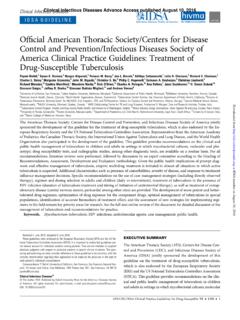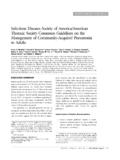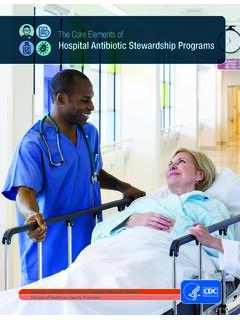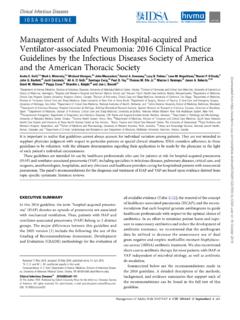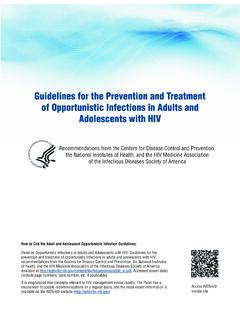Transcription of updated 2/2/2022 - Association of American Physicians and ...
1 An educational resource from the Association of American Physicians and Surgeons ( ) 1 updated 1/3/2023 An educational resource from the Association of American Physicians and Surgeons ( ) 2 A Guide to Home-Based COVID Treatment Step-By-Step Doctors Plan That Could Save Your Life Editor of January 2023 update: Jane M. Orient, Disclaimer: This booklet does not provide individual medical advice or prescribe treatment but is provided as an educational service for patients and their families to know what options are available and widely used for many conditions. Patients should consult the Physicians of their choice for individual medical evaluation and recommendations for treatment tailored to individual needs. If you need emergency care, call 911. Medical knowledge is evolving rapidly. Although the efforts are taken to keep the information contained in this booklet current, authors cannot guarantee that it reflects the most up-to-date research.
2 The authors make no warranties, expressed or implied, regarding errors or omissions and assume no legal liability or responsibility for loss or damage resulting from the use of information contained within this booklet. Disclosure: All Physicians consulted for developing this Guide are actively treating COVID patients and are focused on early, home-based delivery of medical treatment options unless critical care in hospital is determined to be urgently needed. Some of them offer products that they recommend for prevention or treatment. We have not evaluated these products. Jane M. Orient, , an internist, is executive director of the Association of American Physicians and Surgeons. All contributors have volunteered their time and expertise as a community service in view of the COVID-19 national emergency and its consequences to help inform patients of their options.
3 Contributors have received no remuneration for their contributions. The opinions expressed in this guide are those of the physician contributors and not those of any of the institutions with which they have or have had affiliations. An educational resource from the Association of American Physicians and Surgeons ( ) 3 A Guide to Home-Based COVID Treatment Step-By-Step Doctors Plan That Could Save Your Life Table of Contents Introduction Chapter 1: Overview: SARS-CoV-2 Coronavirus and COVID-19 Illness What Is a Coronavirus? How Deadly Is COVID? Stages of COVID Chapter 2: I Have Flu-Like Symptoms: What Should I Do? What Should I Do First? Symptoms of COVID Immediate Home Care Recommendations Should I Get A COVID Test? Early Treatment Is Key to Success What to Expect at Your Physician Consultation Chapter 3: Guide to Early Home Treatment Advantages of Home-Based Treatment Available Medicines, New Uses, Rationale for Combination Treatment Antivirals and Antibiotics Anti-Inflammatories Corticosteroids: Oral and Nebulized Prescription Anticoagulants ( Blood Thinners ): Why Crucial in COVID Vitamins, Supplements, and Oxygen Other Re-purposed Drugs McCullough Protocol Chapter 4: Emerging Prevention and Treatment Options Monoclonal Antibodies Convalescent Plasma Prophylactic Medications Vaccines New Drugs Appendix I: Medical Resources Appendix II: Contributors and Physician Resources for Treatment Appendix III.
4 Sample Forms for Clinical Tracking in COVID An educational resource from the Association of American Physicians and Surgeons ( ) 4 INTRODUCTION A Guide to Home-Based COVID Treatment is built on the rapidly accumulating and changing peer-reviewed published medical research and the clinical experience of practicing Physicians who have decades of experience treating patients with all kinds of illnesses. In this guide, we provide a step-by-step guide to medically sound early treatments of COVID-19 in outpatient settings that in the opinion of the authors have a reasonable probability of therapeutic success. A new coronavirus that was named severe acute respiratory syndrome coronavirus 2 (SARS-CoV-2) suddenly appeared at the end of the year 2019, causing the global pandemic of the illness known as COVID-19 (Coronavirus disease 2019). The severity and course of this illness varies from asymptomatic infection, with no symptoms at all, through mild respiratory symptoms to severe pneumonia that can cause a dangerous condition known as the acute respiratory distress syndrome (ARDS).
5 ARDS may become complicated by damage to many organs of the body leading to death. The recovery from COVID-19 is variable as well, with some patients recovering fast and completely, while others struggle with a chronic prolonged disease called long COVID-19. COVID-19 was a brand new disease and our knowledge about its manifestation and possible treatments has been changing very fast. Taking proper care of COVID-19 patients remains complicated, especially with the appearance of new variants of the SARS-CoV-2 virus. As it happens frequently in medicine, opinions among Physicians about which treatment works best for COVID-19 patients were divided. In the setting of a deadly pandemic such disagreements led to heated discussions about the effectiveness of various drugs proposed as COVID-19 treatments.
6 Typically, such arguments are eventually settled by the results of large-scale randomized clinical trials, which are the gold standard of proof where the best treatments is concerned. Initially, during the global pandemic emergency, performance of those complex studies was not possible in the face of such critical illness. However, with time clinical trials started to be performed and their results analyzed. At the time of this update some Physicians claim that the outcomes of the trials already performed are conclusive, but others question such opinions and believe that more studies should be done. Patients may find the information about the ongoing trials and enroll to participate in them at Dealing with the infectious disease during pandemic rests upon four major pillars: 1) Contagion control (stop the spread of the virus); 2) Early ambulatory, home-based treatment; 3) Late-stage treatment in hospital; 4) Immunity, which can be acquired by going through the infection or through vaccination.
7 An educational resource from the Association of American Physicians and Surgeons ( ) 5 This Guide will focus on the second pillar: early, ambulatory, home-based medical treatment overseen by your physician, using various medications. Some of those medications discussed below like remdesivir (Veklury ) are approved by the Food and Drug Administration (FDA) for the outpatient treatment of COVID-19. Others like nirmatrelvir-ritonavir (Paxlovid ) or (convalescent plasma) are not FDA approved but have been authorized by FDA under an Emergency Use Authorization (EUA). Yet others are approved but for medical conditions other than COVID-19 and were safely used for them in clinical medicine. According to the FDA s own opinion: From the FDA perspective, once the FDA approves a drug, healthcare providers generally may prescribe the drug for an unapproved use when they judge that it is medically appropriate for their patient.
8 Faced with a horrifying emergency, humans typically respond in one of two ways. Some follow the Don t Just Stand There, Do Something! principle, while others stand and watch. With regard to the second pillar of pandemic response, Physicians aligned with the government advocated extreme restraint about any type of home-based treatment of COVID-19 since this disease was new and no proven drugs to treat it were known. Therefore, for many months governmental health agencies simply advised patients to: isolate themselves, drink a lot of fluids, rest in bed, and wait to see whether the disease would pass or worsen to the point that hospitalization was needed. Throughout the pandemic, governmental agencies recommended a very limited number of medications for home treatment. Those were brand new, expensive, and sometimes hard to administer.
9 In general, they were to be used only for special risk categories of patients. The most recent NIH recommendations for outpatient treatment of COVID-19, issued on Dec 28, 2022, advised that all patients should be offered symptomatic treatment and only patients who are at high risk of progressing to severe COVID-19 should be treated with the new antiviral oral drug Paxlovid , which is discussed in detail below. An educational resource from the Association of American Physicians and Surgeons ( ) 6 As circumstances can change rapidly, patients who are interested in up-to-date information about government-approved out-patient treatment options could consult the following official web pages: COVID-19 Therapeutics Locator National Institutes of Health Centers for disease Control and Prevention COVID-19 Treatment and Prevention While most government-affiliated Physicians advocated watchful waiting, many other doctors disagreed with that approach.
10 They claimed that they simply could not just stand there watching their patients get very ill and die. They suggested doing what Physicians have done for decades: namely, to judiciously use known safe drugs, which either improved the course of diseases similar to COVID-19 or had properties that could theoretically stop the COVID-19 virus. That was a common sense approach for them. This is the approach taken in this Guide. It is written to help you understand your options and to TEACH you how to work with your doctor. Treatment administered outside of the hospitalized setting should be under the supervision of a physician or licensed medical professional who is knowledgeable in the use of medications and the monitoring approach for home-based treatment. Patients who worsen in any way should seek emergency room evaluation immediately. Be aware that this issue has been seriously affected by the politicization of medicine.

